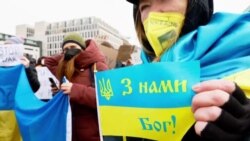Just a day before Russia formally recognized the independence of two territories it nurtured in Eastern Ukraine, then sent in tanks and troops, Russian presidential spokesman Dmitry Peskov made an extraordinary claim.
Speaking to Russian state TV, Peskov said: “We remind you that Russia, throughout all of its history, has never attacked anyone.”
That is false.
Russia has a long history of attacking neighbors going back to the Middle Ages, when it was still only the Grand Duchy of Moscow. But there’s no need to go back that far to show that Russia, including post-Soviet Russia, has indeed attacked or at least engaged in military aggression against its neighbors. The most notable targets have been Moldova, Georgia and Ukraine.
The initial aggression against Moldova and Georgia began in the early 1990s, just as the former Soviet republics were establishing their independence.
Sort of like what we’re seeing now in Ukraine, Russia supported a separatist uprising in Moldova that led to the creation of the unrecognized state of Transnistria, a strip of land between Ukraine and the rest of Moldovan territory. Russian troops remain there.
Also in the early '90s, Russia intervened on the side of separatists in the Abkhazian and South Ossetian regions of Georgia. In 2008, Russia stoked tensions via its South Ossetian proxies that led to a five-day, full-scale war in which Russian forces invaded Georgian government-controlled territory as well. About 850 died and 35,000 Georgians were displaced.
In 2014, Russia used its military to take over and occupy the Crimean peninsula in Ukraine. Shortly thereafter, Russian operatives and mercenaries initiated a war in the Eastern Donbas region, and Russian military forces were used on two occasions regular to prop up the two Russia-backed statelets, the Donetsk People’s Republic (DNR) and Luhansk People’s Republic (LNR).
Peskov’s “never attacked” statement came as the country’s diplomatic officials had insistently denied plans to invade Ukraine after deploying nearly 190,000 troops along its borders. U.S. President Joe Biden had stated publicly that intelligence reports showed Russia was indeed ready to invade.
Peskov’s remarks came just one day before Vladimir Putin extended official recognition to the DNR and LNR after a lengthy, bellicose speech in which he characterized Ukraine’s sovereignty as a mistake of history.
By then, Russian regular military forces were seen moving vehicles across the border into Donetsk. Inside Donbas, the pro-Russian forces’ shelling of infrastructure in Ukrainian government-held territory continued on February 22.
That makes Peskov’s denial of invasion plans, along with numerous similar denials by other Russian officials, hogwash.
On February 16, the Russian Foreign Ministry pinned a tweet on its timeline that quoted its spokesperson, Maria Zakharova, mocking earlier U.S. intelligence predictions of a Russian attack.
“Today we mark another day of the ‘start of war with Ukraine,’ which did not happen again, to the Western media outlets’ regret, no matter how hard they whip up the hysteria,” Zakharova said.
“See for yourselves what the collective Western media and officials’ words are worth.”
The text was accompanied by an animated picture of tumbleweed in the desert.
Similar denials stretch back to last November, when Western intelligence agencies and OSINT (Open Source Intelligence) researchers first noticed a Russian military buildup.
On February 22, Putin clarified that Russia’s recognition of the DNR and LNR would include areas in the provinces that the Ukrainian government currently controls. In other words, Russian forces could push further into Ukraine.
At the same time, he demanded that Ukraine “demilitarize” and promise not to join NATO, the U.S.-European defense alliance. (Under Ukrainian law, the country was officially non-aligned until December 2014.)
With large numbers of Russian troops and vehicles still poised and ready for combat near Ukraine’s borders in Crimea, Moldova and Belarus, it is possible that a much larger invasion will take place with Kyiv as a target.
In his speech, Putin threatened the Kyiv government:
“And from those who usurped and hold power in Kyiv, we demand [they] immediately halt combat activities. If the opposite is the case, all responsibility for potential bloodshed will be entirely and wholly on the conscience of the regime that controls Ukraine’s territory.”
News reports say Russia's proxies in Donbas appear to be responsible for most of the increased shelling going on this week. Ukraine says its forces have been under orders not to return fire. (Russia blames the separatists, though areas being hit are under Ukranian control.)
As such, Putin's words appear to confirm previous Western intelligence pointing to Russia using "false flag" attacks and similar ruses as a pretext to escalate the conflict.






